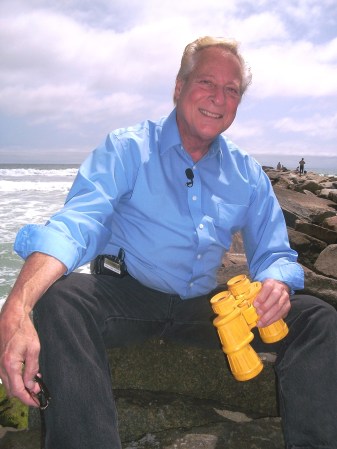
Courtesy Bill Warren
Talk is cheap. That’s why Bill Warren won’t elaborate on his conspiracy theory regarding bin Laden’s death. Instead, he’s taking action. The Fallbrook, Calif. salvage diver is planning a mission to retrieve bin Laden’s body from the bottom of the Arabian Sea.
Having been in the business of salvage diving for more than 30 years, Warren is aware of the dangers and difficulties of rescue missions. The body, he says, “will look like a cigar at the bottom of the ocean.” It’s a mission that will require some heavy – and costly – technology. So is the proof worth the purchase?
To Warren, that’s affirmative. Casting aside all money concerns, the 59-year-old Warren is seeking to confirm bin Laden’s death and sea burial. “I want to prove to myself and probably 50% of the world that he was killed,” he says. Indeed, Warren has found a network of other skeptics: he’s rounded up donors from across the U.S. and as far away as London to help fund the mission, which could cost up to $400,000.
(PHOTOS: See bin Laden’s Pakistan Hideaway)
The extreme expense comes from his use of side-scan sonar for the recovery mission. He’s employing the same equipment that found the Titanic on the floor of the Atlantic Ocean. Side-scan sonar shoots radio waves down to the seafloor, giving a full-color view under the sea. “It’s almost as good as a camera,” Warren says. He expects the operation to cost around $10,000 per day, with the small torpedo-like sonar device crawling along at a paltry 2 miles per hour behind his boat. But what the side-scan sonar lacks in speed, it makes up for in detail, Warren says: “It shows you every little feature on the sea floor. Ripples, rocks, everything.” But can it pinpoint a body, wrapped and buried at untold depths?
“I have to say it would be a real long-shot, more than a needle in a haystack,” Retired Navy Captain Bobbie Scholley says. As a salvage diver for the Navy, Scholley helped to recover TWA Flight 800 after it crashed into the Atlantic in 1996. “That was a 747,” she says. “And it still took us a long time to find that aircraft in the water.”
Salvage missions are complex, three-dimensional operations. The sheer expanse of the Arabian Sea that Warren will have to search is just the first wave to overcome. With each foot of water depth, the difficulty of recovery ramps up exponentially, Scholley says. “I don’t think anyone who was not associated with the actual burial would have any chance at all of finding his body.” And he has hardly a chance of uncovering those details, she says, because that information will likely remain classified for years as a matter of national – and international – security.
(VIDEO: Anatomy of a Raid: Bin Laden’s Final Moments)
“I’ve found every wreck I’ve looked for,” Warren says with the utmost self-assurance. He’s pulled fighters jets out of the Pacific and discovered a 200-year-old shipwreck off the coast of Africa. But those missions were organized for their lucrative nature – the gold and diamonds that sank with the ship. This time, Warren is simply looking to verify the death of the al-Qaeda leader. If he manages to pull the corpse from the seafloor, he plans to “take photographs and video and a sample of his hair” to confirm his DNA against that of bin Laden’s Saudi Arabian family. “But it’s a huge search area,” he admits. What happens if he comes up empty?
He’s seemingly at peace with the possibility of failure, vowing to scour satellite images and question Navy officers to uncover any further clues. And what if he still fails to find bin Laden’s body after all resources are exhausted? “Then I walk away from it and I don’t prove anything,” he calmly says. Warren seems to be more focused on the personal challenge than rabble-rousing.
That’s because he knows there are hurdles – and potential threats – from governments both home and abroad. So he’s swallowing the mission with a healthy dose of reality: “We’ll carry on for a maximum of two months – if I live. Friends are telling me to watch my back.”


